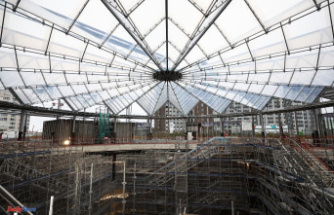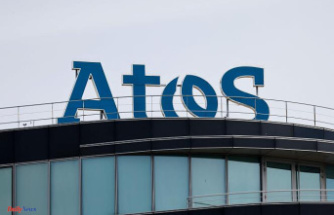Consumers, industry and the public service - according to the will of Economics Minister Robert Habeck, they should all do more to save energy. The Green politician sent two new regulations to his cabinet colleagues on Friday.
Among other things, with the new measures Habeck wants to exceed the voluntary EU energy saving target of 15 percent less gas from the beginning of August to the end of March, compared to the average consumption of the past five years. "According to the current status, Germany has to achieve gas savings of around 20 percent in order to avert a gas shortage," says a paper from his company. Five to eight percent have already been done, they say.
According to the ministry, it will not work without additional voluntary efforts. It is calculated: a reduction in the room temperature in residential buildings and workplaces by an average of two degrees could reduce German gas consumption by around three percent.
The President of the German Taxpayers' Association, Reiner Holznagel, welcomed the planned measures to save energy in public buildings. "Every demanded austerity measure must be exemplified by politics and administration. That's why it's good," he told the "Bild" newspaper.
A series of measures should therefore come into force on September 1st and reduce energy consumption in the short term in the next six months, i.e. until February. The corresponding ordinance must be decided by the cabinet, the Bundestag and Bundesrat do not have to agree.
The following is planned for public buildings:
- Transit areas such as corridors, foyers or technical rooms should no longer be heated - unless there are safety reasons for this.
- Public buildings should only be heated to a maximum of 19 degrees. So far, the recommended minimum temperature according to the ministry was 20 degrees. The new regulation should not apply to clinics, care facilities or other social institutions.
- Boilers and instantaneous water heaters should no longer be used to heat water at the sink - unless this is required for hygienic reasons.
- The lighting of buildings and monuments for purely aesthetic or representative reasons should be switched off.
The following is planned for the private sector or business:
- Clauses in rental contracts that provide for a certain minimum temperature should be temporarily suspended.
- Private pools, whether indoors or outdoors, should no longer be allowed to be heated with gas and electricity.
- Gas suppliers and owners of larger residential buildings should inform their customers or tenants at an early stage - about the expected energy consumption, its costs and possible savings. This should happen by the start of the heating season at the latest.
- Illuminated advertising systems should be switched off from 10 p.m. to 6 a.m.
Second package for the next two years
The second package of measures is aimed at savings for the next two years and is scheduled to come into force on October 1st - if the cabinet and the Federal Council agree. It affects public, private and corporate buildings.
- Annual heating inspections should become mandatory for buildings with gas heating. For example, the systems should be set to lower flow temperatures and a reduction during the night.
- The so-called hydraulic balance can also make heating systems more efficient by optimally distributing the water. It is to become mandatory for large buildings with a central heat supply using natural gas if it has not yet been made.
- Inefficient, uncontrolled heating pumps in buildings with natural gas heating should have to be replaced because, according to the ministry, they are energy guzzlers.
For companies, the second regulation also provides:
- Companies with an energy consumption of 10 gigawatt hours (GWh) per year are obliged to take energy efficiency measures - if they have already carried out an energy audit in which consumption and savings potential are broken down.












